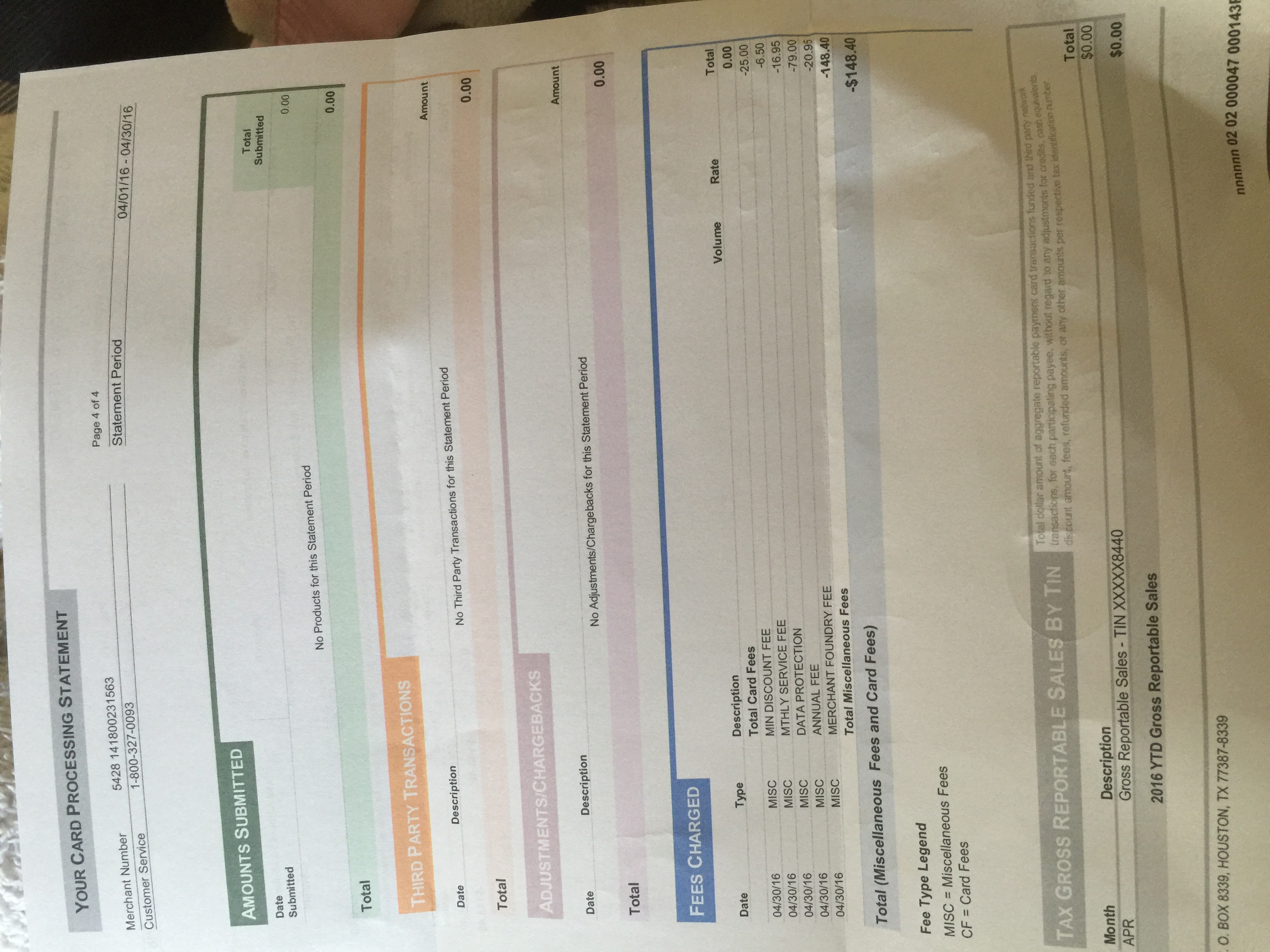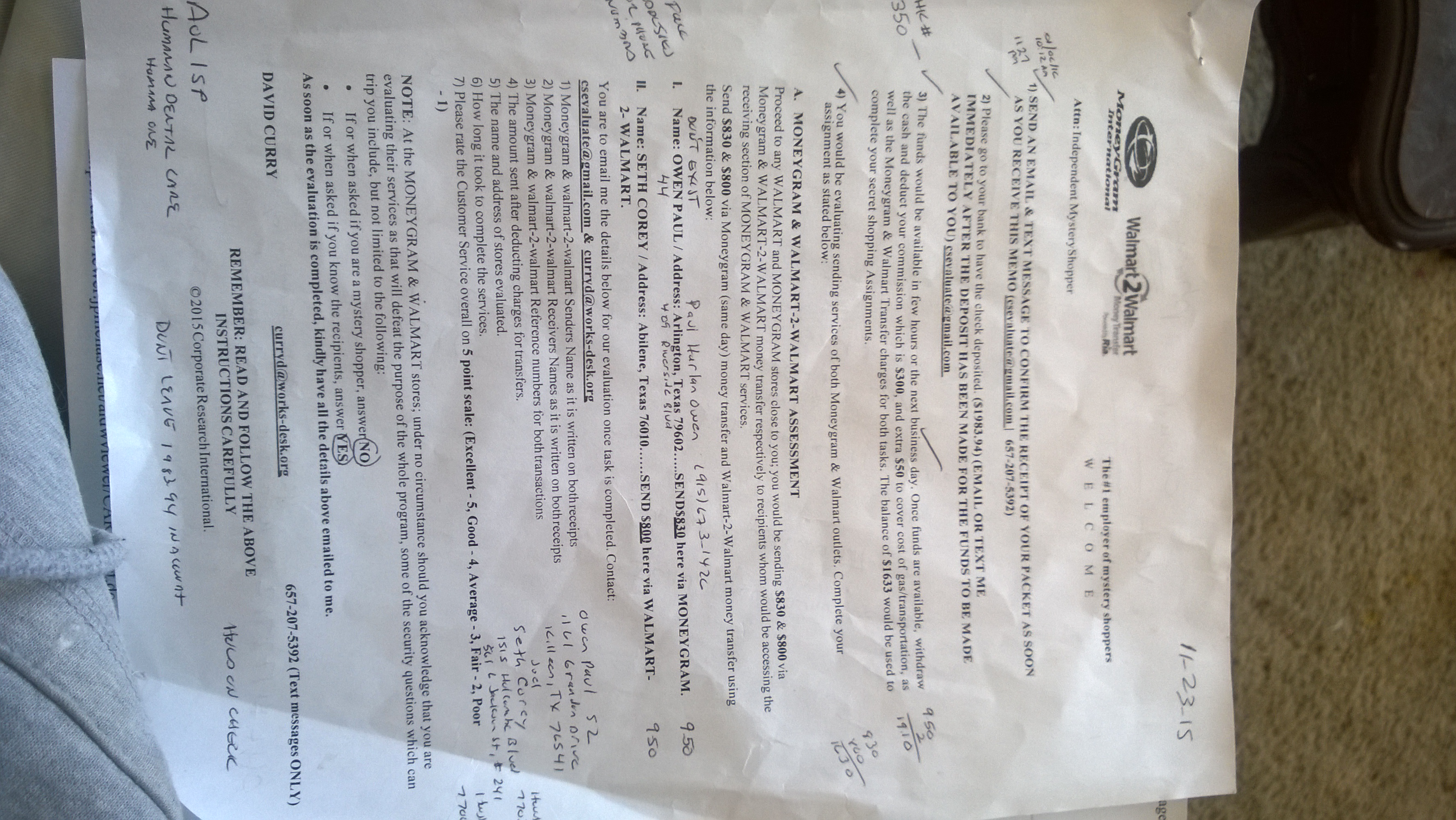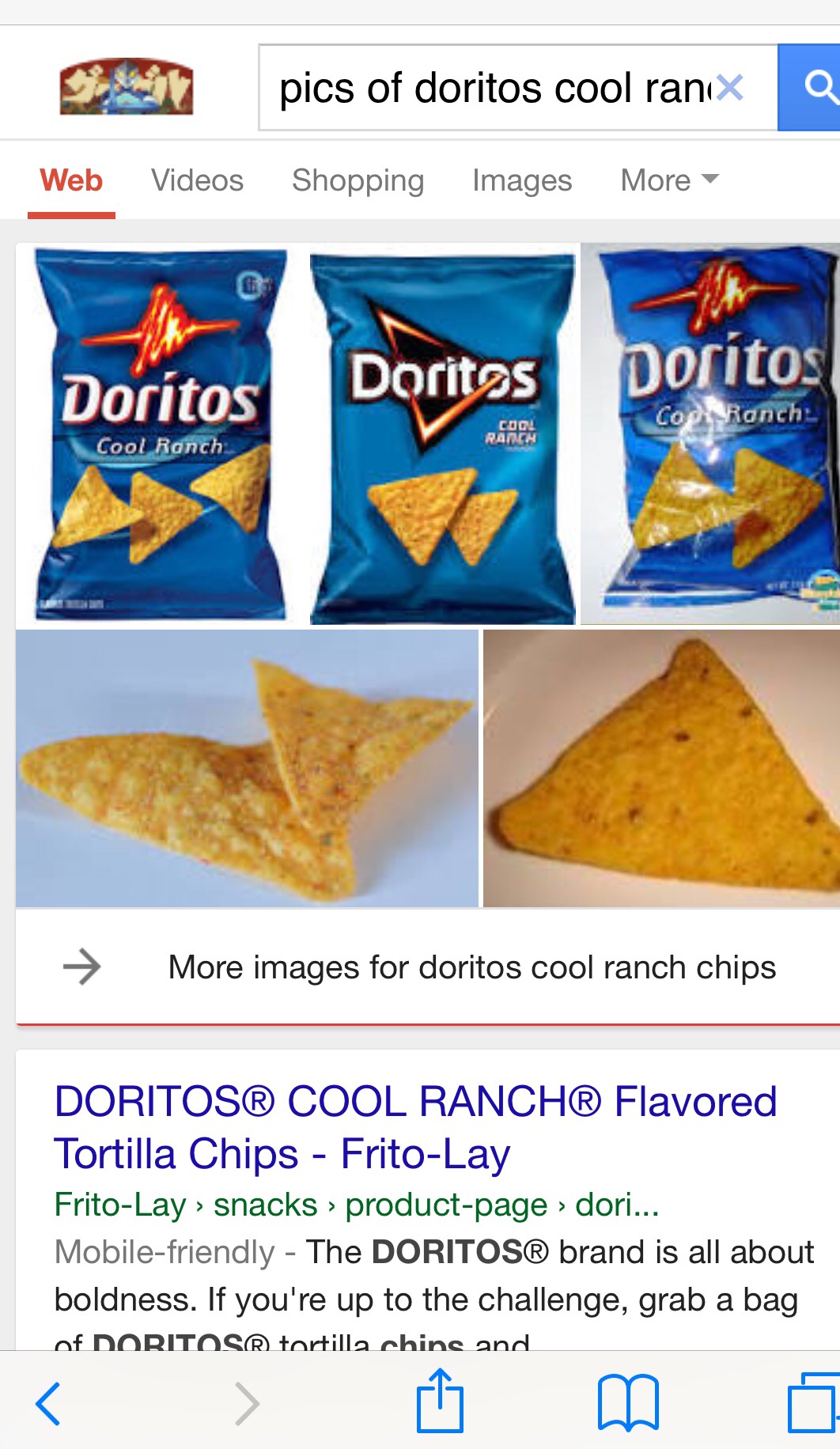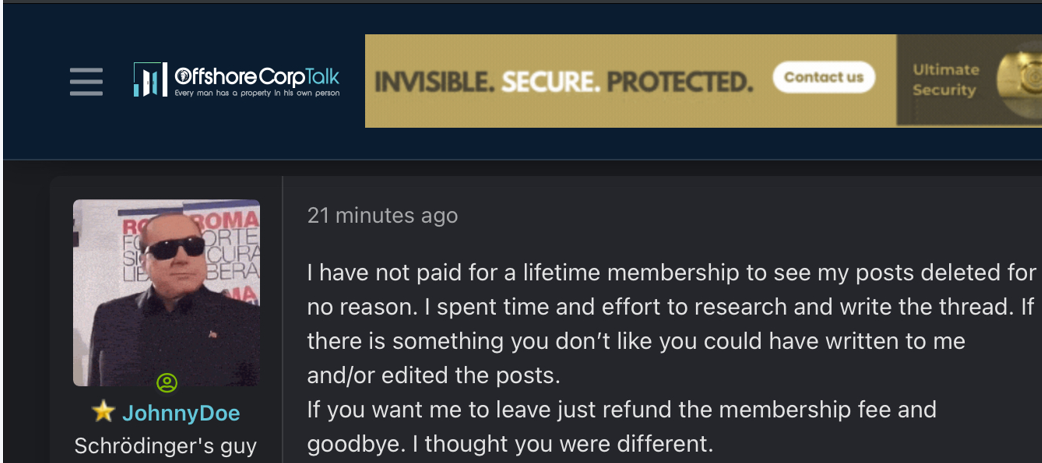Complaint Review: Woodforest National Bank - Leauge City Texas
- Woodforest National Bank League City TX Leauge City, Texas United States of America
- Phone:
- Web:
- Category: Banks
Woodforest National Bank Continuous Overdraft Fees Leauge City, Texas
*Author of original report: The new CARD act
*Consumer Comment: I am also a Chase customer...
*Author of original report: Simplicity
*Consumer Comment: my point exactly Robert...
*Consumer Comment: Hollow Challenge..
*Consumer Comment: Also..a challenge..
*Consumer Comment: Overdraft Protection Disclosure sample-Federal Reserve..
*Consumer Comment: Overdraft Protection Disclosure sample-Federal Reserve..
*Consumer Comment: Edgeman...uhhh
*General Comment: Rony...uhhh....
*Consumer Comment: Edgeman...uhhh...
*Consumer Comment: Robert....why??????
*Author of original report: Such helpful information
*General Comment: My two cents...
*Consumer Comment: The Grass is always greener...
*Author of original report: Real Time
*Consumer Comment: No, Read YOUR PRINT and Avoid The Fees!
I intentionally did not sign up for overdraft protection when I opened my account with Woodforest National Bank to prevent overdraft fees from being charged to my account.
Woodforest decided to pay a charge for $11.00, overdraft my account, charge a $35.00 overdraft fee, and then began charging a "Continuous Overdraft Fee" of $5.00 a day, which I did not become aware of until after my account had accumulated several days worth of charges.
I have closed my account and will never do business with this bank again. Read the fine print and beware!
This report was posted on Ripoff Report on 03/30/2010 09:01 AM and is a permanent record located here: https://www.ripoffreport.com/reports/woodforest-national-bank/leauge-city-texas-77539/woodforest-national-bank-continuous-overdraft-fees-leauge-city-texas-587294. The posting time indicated is Arizona local time. Arizona does not observe daylight savings so the post time may be Mountain or Pacific depending on the time of year. Ripoff Report has an exclusive license to this report. It may not be copied without the written permission of Ripoff Report. READ: Foreign websites steal our content
If you would like to see more Rip-off Reports on this company/individual, search here:
#17 Author of original report
The new CARD act
AUTHOR: swbell23 - (USA)
SUBMITTED: Monday, April 05, 2010
From CreditCards.com 05 April 2010
"Starting in July 2010, new customers WILL NOT BE ALOUD TO OVERDRAFT USING THEIR DEBIT CARDS UNLESS THEY OPT-IN ....."
Which has been my point all along.....I chose NOT to opt in and got charged any way.
'nuff said.
#16 Consumer Comment
I am also a Chase customer...
AUTHOR: Ronny g - (USA)
SUBMITTED: Saturday, April 03, 2010
And I can tell you, they have had their share of complaints, and right after they took over WAMU, customers and employees were subjected to some of Chases policies and were not familiar with them, which led to many issues. Wamu actually had more fair policies before most other banks are currently in the process of doing, or have already done.
But overall, I have been happy with Chase since they have made changes, and ending the tactic of transaction manipulations for the sole intent of maximizing fees at the expense of debit card user error or oversight, it is a big plus in my opinion, especially to those that trusted a bank with their direct deposits, and were fleeced by them.
It is good to know that you take responsibility has I believe in keeping an up to date register, but honestly now, when things are tight and customers are keeping low balances, and check clearing times as many other factors can lead to an inadvertent overdraft, or simply that someone forgot to write a small transaction in the register, should not be subject to policies that were used to protect large check transactions, it just made people angry and allowed the bank to take advantage of it's customers.
A debit card has a number, and a checking account has a number. Although the debit card is tied to the checking account, the polices should not be the same, as is evident by the positive for the consumer changes finally starting to take place all over.
#15 Author of original report
Simplicity
AUTHOR: swbell23 - (USA)
SUBMITTED: Saturday, April 03, 2010
I think the Federal Reserve has it right and these changes will help eliminate many of the complaints found on this and other websites.
Simply put -
Woodforest + Unauthorized approval of debit transactions + my own lack of record keeping to the penny = Overdraft fees and penalties and the resultant closure of my account. ( Which WAS set up on direct deposit resulting in a bonus to the bank as all transactions were processed through this account.)
Chase + Clear understanding that NO overdraft privileges were to be extended + REAL TIME balance = A very satisfied customer.
Again I do not claim that the fault belongs entirely to Woodforest, however as Ronny stated - those banks that use a very simple approach and that REQUIRE clients to sign up for O/D "protection" seem to "coincidentally" have no complaints.
Just saying.....
#14 Consumer Comment
my point exactly Robert...
AUTHOR: Ronny g - (USA)
SUBMITTED: Saturday, April 03, 2010
If that is the case, why does just about every bank defender insult the customers who complain here and accuse them of not reading or abiding by the contract that the bank defenders claim they should have read, or did read and sign, yet still complain?
Surely if a customer states here that they did not sign up for OD protection on their debit card, or they don't know why the bank didn't simply decline the transaction if the account could not cover it, that a bank defender or anyone who claims otherwise should be able to provide some coherent proof, or, stop using that "excuse" against the customers.
As you state, if no one here can prove what the terms were or were not at the time of signing up, perhaps they should not accuse or insult, but simply ask the customer if this was disclosed in their contract. Although whether or not any evidence of my challenge will be provided, it still stands and I will live up to it. But either way I do not believe the lawsuits would have made it this far, the media would give it so much attention, and laws would be going into effect to force changes, if the banks were doing nothing wrong and this was always 100% the customers fault.
Apparently the Federal Judge in upcoming lawsuits claims the banks didn't always disclose this, so he would not dismiss on those grounds, among others. My research shows some banks/credit unions did disclose, and I notice there are no complaints against those banks/credit unions regarding the topic on this site, or that are involved in the lawsuits. Maybe it's a coincidence? Or maybe many of these customers that did complain have a valid reason?
And you spelled stipulation wrong. Not that it bothers me in any way, or takes away any credibility of your argument, but since I also witness some bank defenders on occasion using "off topic" insults in an attempt to discredit posters, I just figured I'd throw that in.
#13 Consumer Comment
Hollow Challenge..
AUTHOR: Robert - (U.S.A.)
SUBMITTED: Saturday, April 03, 2010
Provide evidence that ANY bank or financial institution that had a complaint lodged against them here regarding overdraft fees due to OD protection applied to debit card usage that used a similar disclosure, and I will never post on this site again.... The only stipulation is, which is reasonable, that this type of disclosure was used at the time or before the time the poster signed up with the bank. The reason for the stipulation, is all banks will be required to do this by July of this year, so some that have had complaints may have recently "amended" their terms, so of course that would not apply to the challenge.
The terms of many banks have been posted here many times by many different people. No matter what anyone posts you will come up with some "excuse" as to why that is not what you are looking for. As to your "stipuation". No one on here can prove what the terms were or were not when someone signed up for an account. Gee why not just ask people to prove what someone who posted here had for dinner last week.
#12 Consumer Comment
Also..a challenge..
AUTHOR: Ronny g - (USA)
SUBMITTED: Friday, April 02, 2010
There are some financial institutions (banks, credit unions) that used a virtually identical disclosure to the one I previously posted from the Federal Reserve sample.
And, some of them state the law changes going into effect beginning July of this year which will compel ALL financial institutions to disclose in this way and opt all customers out of automatic and/or mandatory OD protection applied to debit card transactions and ATM withdrawals, unless the customer signs up and requests it.
My challenge is this..and it is simple..
Provide evidence that ANY bank or financial institution that had a complaint lodged against them here regarding overdraft fees due to OD protection applied to debit card usage that used a similar disclosure, and I will never post on this site again.
It may not be possible, as the best of my research indicates that the institutions that use this type of disclosure, "coincidentally" have not had any complaints lodged against them here regarding debit card use related overdraft fees.
The only stipulation is, which is reasonable, that this type of disclosure was used at the time or before the time the poster signed up with the bank. The reason for the stipulation, is all banks will be required to do this by July of this year, so some that have had complaints may have recently "amended" their terms, so of course that would not apply to the challenge.
#11 Consumer Comment
Overdraft Protection Disclosure sample-Federal Reserve..
AUTHOR: Ronny g - (USA)
SUBMITTED: Friday, April 02, 2010
Here is an example from the Feds of what an Overdraft protection disclosure "should" look like. It is coherent to the average consumer, simple and reasonable...and most of all fair and without deception.
Debit Card Overdraft Disclosure - Sample From Federal Reserve
What You Need to Know about Overdrafts and Overdraft Fees
An overdraft occurs when you do not have enough money in your account to cover a transaction, but we pay it anyway. We can cover your overdrafts in two different ways:
1. We have standard overdraft practices that come with your account.
2. We also offer overdraft protection plans, such as a link to a savings account, which may be less expensive than our standard overdraft practices. To learn more, ask us about these plans.
What are the standard overdraft practices that come with my account?
We do authorize and pay overdrafts for the following types of transactions:
Checks and other transactions made using your checking account number Automatic bill payments
We do not authorize and pay overdrafts for the following types of transactions unless you ask us to: ATM transactions, Everyday debit card transactions
We pay overdrafts at our discretion, which means we do not guarantee that we will always authorize and pay any type of transaction. If we do not authorize and pay an overdraft, your transaction will be declined.
What fees will I be charged if [Institution Name] pays my overdraft?
Under our standard overdraft practices: We will charge you a fee of up to $30 each time we pay an overdraft. Also, if your account is overdrawn for 5 or more consecutive business days, we will charge an additional $5 per day. There is no limit on the total fees we can charge you for overdrawing your account.
What if I want [Institution Name] to authorize and pay overdrafts on my ATM and everyday debit card transactions?
If you also want us to authorize and pay overdrafts on ATM and everyday debit card transactions, call [telephone number], visit [Web site], or complete the form below and [present it at a branch][mail it to: -------------------------------------------------------------___ I do not want [Institution Name] to authorize and pay overdrafts on my ATM and everyday debit card transactions. ___ I want [Institution Name] to authorize and pay overdrafts on my ATM and everyday debit card transactions.
Printed Name: _________________________ Date: _________________________ [Account Number]: _______________________ ]
Anyone have a problem with this? Please let me know.
#10 Consumer Comment
Overdraft Protection Disclosure sample-Federal Reserve..
AUTHOR: Ronny g - (USA)
SUBMITTED: Friday, April 02, 2010
Here is an example from the Feds of what an Overdraft protection disclosure "should" look like. It is coherent to the average consumer, simple and reasonable...and most of all fair and without deception.
Debit Card Overdraft Disclosure - Sample From Federal Reserve
What You Need to Know about Overdrafts and Overdraft Fees
An overdraft occurs when you do not have enough money in your account to cover a transaction, but we pay it anyway. We can cover your overdrafts in two different ways:
1. We have standard overdraft practices that come with your account.
2. We also offer overdraft protection plans, such as a link to a savings account, which may be less expensive than our standard overdraft practices. To learn more, ask us about these plans.
What are the standard overdraft practices that come with my account?
We do authorize and pay overdrafts for the following types of transactions:
Checks and other transactions made using your checking account number Automatic bill payments
We do not authorize and pay overdrafts for the following types of transactions unless you ask us to: ATM transactions, Everyday debit card transactions
We pay overdrafts at our discretion, which means we do not guarantee that we will always authorize and pay any type of transaction. If we do not authorize and pay an overdraft, your transaction will be declined.
What fees will I be charged if [Institution Name] pays my overdraft?
Under our standard overdraft practices: We will charge you a fee of up to $30 each time we pay an overdraft. Also, if your account is overdrawn for 5 or more consecutive business days, we will charge an additional $5 per day. There is no limit on the total fees we can charge you for overdrawing your account.
What if I want [Institution Name] to authorize and pay overdrafts on my ATM and everyday debit card transactions?
If you also want us to authorize and pay overdrafts on ATM and everyday debit card transactions, call [telephone number], visit [Web site], or complete the form below and [present it at a branch][mail it to: -------------------------------------------------------------___ I do not want [Institution Name] to authorize and pay overdrafts on my ATM and everyday debit card transactions. ___ I want [Institution Name] to authorize and pay overdrafts on my ATM and everyday debit card transactions.
Printed Name: _________________________ Date: _________________________ [Account Number]: _______________________ ]
Anyone have a problem with this? Please let me know.
#9 Consumer Comment
Edgeman...uhhh
AUTHOR: Ronny g - (USA)
SUBMITTED: Friday, April 02, 2010
No one is arguing that there are lots of things people "should" do, but don't. However, it won't hold up as a defense in court for many reasons, and I think you know that, and I think you know why..well I hope you do as a "reasonable" individual....
"There is no benefit to signing a legally binding agreement without reading and understanding it beforehand. It's frightening to think of the liabilities one may be exposing themselves to if they habitually sign agreements without knowing what is in them. A bank agreement that discloses their processing methods upfront and tells the consumer that he or she is responsible for their deposits, transactions and withdrawals is not deceptive. A bank agreement that discloses OD protection is not deceptive either."
It's actually refreshing to know there are stipulations in contract laws that protect those that sign contracts, whether they read and fully understood it or not, that protects them from being swindled. And nice to know we live in a world where at least some people understand right from wrong and where "right" will on occasion trump "greed".
However it appears that not all contracts signed by the customers disclosed everything, I have not read WoodForest National Banks, but if this customer did not sign up for overdraft protection, it certainly was not in good faith for the bank to enroll the customer in it, which is part of what the lawsuits will address, and why the laws are changing soon to prevent the banks from continuing that practice, or "tactic" as many refer to it.
"You shouldn't be. What are the potential liabilities for using an educational version of Photoshop CS4 to create twenty-five files that are used in national ad campaigns? Violating the terms of a software agreement can lead to paying out a lot more money than we typically talk about here at ROR. Bank fees and software license violations have one thing common - they can both be avoided by understanding the legally binding agreement before signing."
That's not the point, the point is intent, or as I previously stated...
"The essence of the good faith covenant is objectively reasonable conduct". If someone doesn't understand that and it ends up in court, that is how it will be decided if what is stated in a contract holds up as a defense.
But the reason I stated I was speechless, is because a piece of software is not a bank. We are not trusting a piece of software with our direct deposits, the software has no policies that compound overdraft fees by using policies designed to protect large check transactions against those that use the debit card to buy a cup of coffee.
"Yes, but in the meantime one should not be surprised if an entity operates within the agreement established with that person."
Perhaps, and once again with the "should", however myself, a Federal Judge, a group of lawyers and millions of customers differ in the "opinion" that what may or may not be stated in ones terms agreement with the bank, will be a valid defense against the plaintiffs. Thrown out already during the dismissal stage, no surprise there for me.
#8 General Comment
Rony...uhhh....
AUTHOR: Edgeman - (U.S.A.)
SUBMITTED: Friday, April 02, 2010
Once again this comes down to understanding the agreement one makes with the bank. If one does not wish to do business with a bank that processes transactions from highest-to-lowest, then he or she should not sign an agreement that indicates that method. If one does not wish to do business with a bank that assesses a continuous negative balance fee, that person should not sign an agreement with a bank that has this item in their fee schedule. It was fair enough to the account holder when he or she opened the account and it does little good to cry foul AFTER the fact. At that point the consumer can search for a bank or credit union that is more to their liking. We all seem to be in basic agreement that one should read and understand a legally binding agreement before signing it.
"And of course everyone should read the fine print, but as is evident, many don't, or do any simply do not fully understand the implications. People have always held the banks to a higher standard then a rental car agreement since the banks keep OUR money, are insured by the Feds, not to mention use taxpayer dollars to bail them out when they mess up. A lease agreement is generally very simple and standard and does not allow for any deception regarding late charge fees. Late with rent, you pay a fee. Not exactly the same as mandatory OD protection and re-sequencing, and excessive check clearing times and statement manipulations all used by the bank with intent to financially pillage a percentage of it's customers. "
There is no benefit to signing a legally binding agreement without reading and understanding it beforehand. It's frightening to think of the liabilities one may be exposing themselves to if they habitually sign agreements without knowing what is in them. A bank agreement that discloses their processing methods upfront and tells the consumer that he or she is responsible for their deposits, transactions and withdrawals is not deceptive. A bank agreement that discloses OD protection is not deceptive either.
"A software agreement compared to a bank terms? I am speechless on that one."
You shouldn't be. What are the potential liabilities for using an educational version of Photoshop CS4 to create twenty-five files that are used in national ad campaigns? Violating the terms of a software agreement can lead to paying out a lot more money than we typically talk about here at ROR. Bank fees and software license violations have one thing common - they can both be avoided by understanding the legally binding agreement before signing.
"Now, just because something is written in a bank or any contract, does not always mean it is right, ethical, or will always hold up in court. Which is why the Judge presiding over some current lawsuits against the Banks have denied the banks during the dismissal process of the lawsuit, siting "Breach of Implied Covenant of Good Faith and Fair Dealing". Also, here is a quote.."
Yes, but in the meantime one should not be surprised if an entity operates within the agreement established with that person.
#7 Consumer Comment
Edgeman...uhhh...
AUTHOR: Ronny g - (USA)
SUBMITTED: Thursday, April 01, 2010
Correct, although Roberts reply was provoking and redundant, the changes in policy regarding OD protection are not going to prevent all overdrafts from occurring. It is only to be more fair to DEBIT card users. If the account does not have the funds to cover a transaction for ANY reason, at a point of sale or an ATM, the transaction will be declined IF..the customer is OPTED OUT of overdraft protection. It has nothing to do with the customers responsibility per say, but it finally gives the bank some responsibility to it's customers, and is the beginning of the end of this cash cow that was a main reason for so many complaints lodged here and elsewhere, and a primary reason for all the lawsuits
And of course everyone should read the fine print, but as is evident, many don't, or do any simply do not fully understand the implications. People have always held the banks to a higher standard then a rental car agreement since the banks keep OUR money, are insured by the Feds, not to mention use taxpayer dollars to bail them out when they mess up. A lease agreement is generally very simple and standard and does not allow for any deception regarding late charge fees. Late with rent, you pay a fee. Not exactly the same as mandatory OD protection and re-sequencing, and excessive check clearing times and statement manipulations all used by the bank with intent to financially pillage a percentage of it's customers.
A software agreement compared to a bank terms? I am speechless on that one.
Now, just because something is written in a bank or any contract, does not always mean it is right, ethical, or will always hold up in court. Which is why the Judge presiding over some current lawsuits against the Banks have denied the banks during the dismissal process of the lawsuit, siting "Breach of Implied Covenant of Good Faith and Fair Dealing". Also, here is a quote..
"King (the Judge) also disregarded defense arguments that customers voluntarily entered into a contract with banks and agreed to overdraft protection terms, including the fees. He sided with plaintiffs in their view that
the disparity in sophistication and bargaining power between customers
and their banks "is obvious," and customers did not know they had the
option to decline the overdraft protection service."
Here are some sections I dug up from the California Causes of Action since California customers are involved in the lawsuits, as well as many other states...
In every contract there is an implied covenant of good faith and fair dealing by each party not to do anything which will deprive the other parties of the benefits of the contract, and a breach of this covenant by failure to deal fairly or in good faith gives rise to an action for damages.
In a joint venture, the parties owe one another the duty of fair, open, and honest disclosure. They cannot secure or accept secret gains by connivance, deceit, or suppression of facts.
The precise nature and extent of the duty imposed depends on the contractual purposes.
Some legal history...
The essence of the good faith covenant is objectively reasonable conduct. Badie v. Bank of Am., 67 Cal. App. 4th 779, 796, 79 Cal. Rptr. 2d 273, 284 (1998) (banks addition of an entirely new term to credit card account holders by sending a notice of change of terms requiring ADR along with their account statements was not objectively reasonable even though account agreement gave bank unilateral and non-negotiable right to change every aspect of performance required under it); Lazar v. Hertz Corp., 143 Cal. App. 3d 128, 141, 191 Cal. Rptr. 849, 857 (1983).
#6 Consumer Comment
Robert....why??????
AUTHOR: Ronny g - (USA)
SUBMITTED: Thursday, April 01, 2010
Simple question....Why did you feel the need to respond in your typical condesending way which will only anger the customer, and PROVOKE negativity? Why?
The OP lodged the complaint. The complaint was responded to by a bank defender. The poster explained quite reasonably that, and I quote and underline KEY points...
"No need for name calling, you obviously are an intelligent, articulate, well meaning individual who has simply missed the point. If Woodforest would manage their system properly, then updates would occur to account balances in REAL TIME. The technology exists, and as a matter of fact I do have another bank account, with Chase Bank. Whenever I make a purchase with my Chase account, it updates my balance. No money? No approval. Which of course prevents overdrafts.
My main concern with Woodforest is the concept of a "Continuous Overdraft Fee" which I admit was disclosed in the account opening documents, hence my statement that I should have "read the fine print".
Banks and credit card companies are in business to make money, however some of the methods used are below the radar of most consumers.
Ultimately the responsibility is mine, I posted this to let people know of the practice so hopefully others can avoid the same pitfall.
If Woodforest would manage their system properly, then updates would occur to account balances in REAL TIME."
So, the OP clearly admits responsibility and plainy states the reason to post here is to let others know of the pitfall, and perhaps help prevent others from overdrating. AND, he feels as MANY do, that some policies that contribute to and/or even actually encourage overdrafting, are unnessecary and perhaps should be a concern, since we know some can make a mistake with the register, may not keep one, or an unauthorized or unknown hold can be placed on a debit card. Not to mention excessive check deposit clearing times which we need not get into that here, but it happens as is self evident.
Why Robert, WHY does that bother you so much? Why do you need to not only defend the bank and belittle the posters, but then defend another bank defender that already responded rudely, but was treated with respect and integrity by the OP regardless of the misunderstanding of the point, and took responsibility?
Yes, you can call me a troll, I do not care what any bank defenders call me or think of me, but what is the reason you needed to post here just to provoke others who are being fair and reasonable? Do you have a reason for this? Any personal gain? Because if not..you just proved yourself beyond ANY shadow of a doubt, that you are a troll.
#5 General Comment
My two cents...
AUTHOR: Edgeman - (U.S.A.)
SUBMITTED: Thursday, April 01, 2010
Regarding Robert's comment about Chase bank...
I actually received a notice in the mail from Chase a couple pf days ago. They are asking account holders if they want overdraft protection. According to their new policy, the overdraft fees are capped at three per day. If somebody keeps a negative balance for a number of days then an extended overdraft fee will be applied. Robert is correct in that one will still have to manage their account in order to avoid overdraft fees.
The OP's last sentence warrants comment. Indeed, everybody should read the fine print. That goes beyond checking account agreements. Whether it's a rental agreement, a car loan, a lease, a software user license, a liability waiver or any other kind of document it is a good idea to read a legally binding agreement before signing it. If you don't understand it, put off signing it until you do.
#4 Author of original report
Such helpful information
AUTHOR: swbell23 - (USA)
SUBMITTED: Thursday, April 01, 2010
It is so nice to know that there are so many helpful folks out there such as yourselves. It never ceases to amaze me that no matter where I go I find kind, considerate and caring people who have the time and energy to explain the little facets of life that seem to pass me by.
Thanks for being so wonderful!!
Yes it was MY FAULT, yes I SHOULD WRITE EVERYTHING DOWN ( Who does that ....really?????)
Bottom line - if you are like me and want to avoid the problem described here in .
USE Pocket First National!!!!
And by the way - Overdraft fees are one thing.....
BUT a Continuous DAILY overdraft fee???????? Bull$hitake Mushrooms!
#3 Consumer Comment
The Grass is always greener...
AUTHOR: Robert - (U.S.A.)
SUBMITTED: Thursday, April 01, 2010
If Woodforest would manage their system properly, then updates would occur to account balances in REAL TIME.
- Oh really THEY should manage THEIR system? How about YOU managing YOUR account.
The technology exists, and as a matter of fact I do have another bank account, with Chase Bank. Whenever I make a purchase with my Chase account, it updates my balance
- Again..Really? So every one who "claims" that Chase intentionally hides their transactions on-line is lying? Or perhaps it really does come down to the Merchant and the Processor as to when they submit it to the bank.
No money? No approval. Which of course prevents overdrafts
- Wow that grass is really green. Because they currently do not do that, again unless everyone else is lying. Now they are putting this into effect but it will not be until early April(I believe). However, this still will not guarantee that you can't overdraft
My main concern with Woodforest is the concept of a "Continuous Overdraft Fee"
- You mean that fee that just about every major bank charges..including Chase.
Ultimately the responsibility is mine
- That is the BEST thing you said. It is YOUR responsibility to manage YOUR money.
I posted this to let people know of the practice so hopefully others can avoid the same pitfall.
- Here is a better way. Don't rely on on-line/phone/ATM banking as they were meant to only be a tool to assist you in managing your account. They were never meant to be the primary method of account management. This is because they don't know what you have out until it gets submited to them. Now, what should you be using..a Register. Here you write down EVERY transaction you make when you make it. This way it does not matter if it shows up on-line in 1 second or 1 week. YOU know you spent the money. In addition to that make sure you don't even attempt to spend more than you have available. Just doing those couple of things will just about guarantee you that you will not overdraft.
#2 Author of original report
Real Time
AUTHOR: swbell23 - (USA)
SUBMITTED: Wednesday, March 31, 2010
No need for name calling, you obviously are an intelligent, articulate, well meaning individual who has simply missed the point. If Woodforest would manage their system properly, then updates would occur to account balances in REAL TIME. The technology exists, and as a matter of fact I do have another bank account, with Chase Bank. Whenever I make a purchase with my Chase account, it updates my balance. No money? No approval. Which of course prevents overdrafts.
My main concern with Woodforest is the concept of a "Continuous Overdraft Fee" which I admit was disclosed in the account opening documents, hence my statement that I should have "read the fine print".
Banks and credit card companies are in business to make money, however some of the methods used are below the radar of most consumers.
Ultimately the responsibility is mine, I posted this to let people know of the practice so hopefully others can avoid the same pitfall.
#1 Consumer Comment
No, Read YOUR PRINT and Avoid The Fees!
AUTHOR: Jim - (USA)
SUBMITTED: Tuesday, March 30, 2010
Canceling or not signing up for overdraft protection isn't the issue. Neither is reading whatever you define as "fine print". YOU initiated the $11 charge which overdrafted you account. Who did? YOU did! Like a broken record, here we go again! If YOU would have been PROPERLY MANAGING your account by keeping written records of every account usage and doing the math with each and every transaction, then YOU would have seen YOUR PRINT and YOUR PRINT would have clearly shown you didn't have enough money in the account for the $11 debit. But of course, you don't keep written records like all the other subprime thinkers and now that you overdrafted your account...oh yes, its the bank's fault! What a bunch of pure horse s-it!
So go ahead and take your subprime "thinking" to another bank and then another and then another because you don't have the maturity to learn from your obvious mistakes and begin managing your money correctly!
Go ahead, call me names!

Advertisers above have met our
strict standards for business conduct.








































